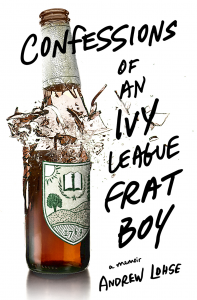I can vividly recall the day I first heard the name “Andrew Lohse.”
It was in the spring of my senior year of high school, and like many Dartmouth Early Decision admits, I was doing my best to maintain some semblance of academic focus while enjoying the first warm days of a Vermont spring and a social life that had finally been unburdened from the stress of the college application process. After getting home from school one day, I was greeted by a copy of Mr. Lohse’s now infamous Rolling Stone piece and an attached post-it note from my mother, stating “Please read this and be prepared to talk about it tonight.”
Although I maintained a brave face during the dinner discussion that followed, at heart I found the article deeply unsettling. For me, the most concerning part of Mr. Lohse’s account was not the graphic details of hazing or his multiple run-ins with the law, but the questions raised by its underlying premise: how had an innocent, highly motivated young man turned into an alcoholic, cocaine-obsessed delinquent after less than two years at Dartmouth? Was this transformation truly a product of the College’s social culture and Greek system? If so, could it happen to those of us who were matriculating in the wake of the Rolling Stone scandal?
These concerns were only amplified after reading that Mr. Lohse’s pre-Dartmouth experience was remarkably similar to mine. Both of us hail from middle-class, public school backgrounds. Both of us had been highly motivated students and accomplished jazz musicians in high school. And both of us had made Dartmouth our top choice for college and applied Early Decision after growing up idolizing a grandfather who had graduated from the College in the 1940s.
Nor did the similarities between the two of us end there; they continued after my matriculation. Like Mr. Lohse, I joined the Barbary Coast Jazz Ensemble and The Dartmouth Review during freshman year (though it should be noted that Mr. Lohse only wrote for this paper briefly before reversing his political ideology and contributing to the now-defunct Dartmouth Free Press). Most importantly, last fall I pledged Sigma Alpha Epsilon, and I have now spent an entire year as a brother of the same fraternity that Mr. Lohse blames for his ultimate devolution.
Taking these similarities into account, I find myself with a unique perspective for reviewing his recently released memoir, Confessions of an Ivy League Frat Boy (Thomas Dunne Books, 320 pages). Framed as a much lengthier version of the original Rolling Stone piece, the book chronicles Mr. Lohse’s time at the College and includes numerous new accounts of hazing and other illegal behavior. Although these additions make for an original work, the memoir will look familiar to most readers in its reliance on the same premise that characterized his earlier writing: namely, that his decline into substance abuse and hazing participation was due to the influence of cultural forces within SAE and Dartmouth, rather than any personal failings on his part.
Given that I come from such a similar background and have joined the same campus groups at Dartmouth, I should state up front that I do not have much sympathy for this argument. Applying its logic, readers of Mr. Lohse’s book might also expect me to be an alcoholic, drug-addled degenerate with at least one arrest for cocaine possession under my belt. Fortunately, this is not the case. In fact, the friendships I have built and the experiences I have had at Dartmouth have driven me in the opposite direction of the excess and self-destruction that characterized Mr. Lohse’s life at the College. During my time in Hanover, SAE has supported my personal growth and amplified my drive for success in all areas of life, definitively assuaging my original concerns from the Rolling Stone article. For this reason, I believe that the source of Mr. Lohse’s problems cannot be found in the organizations he associated with or in the institutional forces of Dartmouth as a whole; instead, it resides in the series of incredibly poor decisions he made during his time at the college.
Mr. Lohse begins his narrative with a brief depiction of “doming”, a popular drinking competition in many Dartmouth fraternities that essentially consists of two brothers chugging successive cups of beer until the loser vomits. In some cases, including the particular instance Mr. Lohse describes, the winner can claim his prize by vomiting on his unfortunate competitor’s head. This introductory anecdote sets up two themes that persist throughout the remainder of the book: Mr. Lohse’s use of vivid descriptions of gruesome behavior for dramatic effect and his inclusion of nonsensical figurative language in an attempt to make his writing sound more mature.
In this case, Mr. Lohse ties the feeling of vomit on his head to that of amniotic fluid in the womb. At other points, he compares the sun’s rays to the color of Keystone Light beer, Dartmouth’s major campus buildings to the archaeological ruins of a fallen empire, and a female security officer’s face to a baseball mitt (the last one seems particularly absurd, even when taking into account the copious amounts of cocaine and alcohol that were in his bloodstream during his encounter with the officer).
This questionable writing style also permeates Mr. Lohse’s brief account of his freshman year at Dartmouth. Here, he focuses on the politics of rush and his perception that pledging a fraternity was the only way to become a true “Dartmouth man,” but he undermines this discussion of Greek life by portraying the College as a dangerous cult run by the “high Pharisees” of Parkhurst. His attempt to paint the harmless freshman tradition of running laps around the Homecoming bonfire as a cult initiation is unsupported by the rest of his argument, and survivors of the Bataan Death March would likely take issue with his characterization of the preceding freshman parade as a POW march. These tortured metaphors are as prolific as Mr. Lohse’s misdemeanors and serve as unfortunate comedic distractions throughout the book. One would hope that other Dartmouth English majors are able to avoid this sort of pitfall in their writing.
Beneath his ineffective prose lies the other great shortcoming of Mr. Lohse’s memoir: his total unwillingness to admit personal responsibility for his failings at Dartmouth. Throughout the work, he insists that his bad experiences were caused not by his personal behavior or bad decisions, but by social forces operating within Dartmouth and its Greek system. The irony of this argument is that in making it, Mr. Lohse suggests that fraternity life robbed him of his individual agency and indoctrinated him into a self destructive cult; all the while, he robs his peers of theirs by imposing his experiences, motives and bad habits onto them through his portrayal of his failings as typical outcomes of Greek life.
Nowhere does this self-defeating tendency become more apparent than in his discussion of his romantic life while at the College. In Mr. Lohse’s mind, his breakup with his girlfriend during pledge term was due to the social necessity of belonging to a fraternity and the large time commitment pledging required. However, his allegation that “frats are where romance goes to die” is unfounded, as (by my count) at least two members of Mr. Lohse’s class are now engaged to girlfriends they dated throughout their time at SAE. In addition, around a quarter of today’s brotherhood is involved in long-term relationships. Many of these existed throughout the pledge terms of each class.
The true reason for Mr. Lohse’s pledge term breakup was his own decision to prioritize hanging out at the house and drinking over spending time with his girlfriend, and his attempt to blame SAE for it collapses under the realization that many other brothers have successfully maintained relationships throughout the pledging process.
By portraying this breakup experience as an inevitable outcome of fraternity life, he projects his self-inflicted misfortune onto his peers, the vast majority of whom cannot identify with it.
Mr. Lohse takes a similar approach to averting self-blame while recounting his decision to try cocaine for the first time. In the book, he describes his willingness to try the expensive drug as seduction by the culture of elite privilege surrounding it, rather than as a bad choice on his part. While there was certainly peer pressure to snort his first line, no one forced him to do so, and the ultimate decision was his alone. As with the breakup, Mr. Lohse’s portrayal of drug abuse imposes his experiences on everyone who surrounded him, making it seem as if the norm for Dartmouth fraternity brothers is to be helplessly railroaded into frequent substance abuse by the culture surrounding them.
Most responses to Confessions of an Ivy League Frat Boy have attempted to engage with the book as if it is a serious reflection on hazing and substance abuse within Dartmouth’s Greek system. This approach is a mistake and gives the book far more credit than it deserves. Based on Mr. Lohse’s lurid prose and his consistent portrayal of his personal failings as inevitable cultural products, Confessions is best characterized as a mass-market pulp novel designed to sell copies by attracting the interest of readers unfamiliar with Dartmouth, her students, and its Greek life. This end product is somewhat surprising given Mr. Lohse’s expressed desire in his earlier written pieces to turn his Dartmouth experience into a “great American novel” and become a “modern Hunter S. Thompson.” I can think of innumerable descriptors for Confessions but “great American novel” is not one of them. At best, the book represents an awkward attempt to turn Mr. Lohse’s fifteen minutes into an hour and make the most financially of his failed college years. With this in mind, potential readers would be wise to take Mr. Lohse’s writing with a generous handful of salt and not let it unduly mar their impressions of the College on the Hill.



Be the first to comment on "Reviewing “Confessions”"